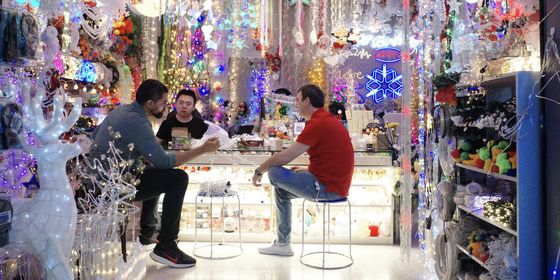Proximity to the sea has influenced the dialect of this Zhejiang port city
While Ningbo’s name literally means “calm waves,” the dialect in this eastern port city sounds positively tempestuous. Compared with the dialect of nearby Suzhou, which is described as soft like sticky rice, “the speech of Ningbo locals is hard as stone and iron (石骨铁硬宁波话 shí gǔ tiě yìng Níngbōhuà).”
Ningbo (宁波), formerly known as Mingzhou (明州), is one of China’s oldest cities, with evidence of human activity there dating back to 6,300 BCE. The Ningbo dialect has been traced to 2,000 years ago. Back then, Ningbo is believed to have been an important weapons-producing settlement. As the locals used to craft the weapons with stone and iron, they allegedly brought that same steely toughness to their language. Nowadays, even when they offer a friendly “Have you eaten?” (a common greeting in China), Ningbo locals say, “Have you cut your food(饭切过伐 Fàn qiē gāo fá)?”
Today, the Ningbo dialect has an estimated 7 million speakers, and just like the crisp and clear rhythms of a blacksmith’s hammer, it has a notoriously harsh sound. Locals have also developed the habit of using onomatopoeia for certain actions. For example, dudu (笃笃 dǔdǔ) is the sound of a bamboo clapper that street vendors selling wonton soup would beat together to attract customers in the old days. When speakers of Ningbo dialect describe the action of knocking, they not only use the verb “to knock (敲 qiāo),” but add the “dudu” sound in front: 笃笃敲 (dǔdǔ qiāo).
Ningbo’s location on the east coast has meant the sea and seafood have become an intrinsic part of the city’s culture. In fact, Ningbo locals love seafood so much that sea-creature metaphors are a key feature of their dialect.
For example, a “dead crab (死蟹一只 xī hā yī zá)” is Ningbo slang for something hopeless. To express idea that everyone is different, Ningbo locals say, “Shrimps have their way, and crabs have theirs (虾有虾路,蟹有蟹路 xiā yǒu xiā lù, hā yǒu hā lù).” When one gets unbelievably lucky, they say, “When luck comes, even a steamed crab can crawl in (运道来了推勿开,烤熟毛蟹爬进来 Yùndao láile tuī wù kāi, kǎoshú máohā pá jìnlái).” A drunk person is called a “tipsy crab (醉蟹 zuìhā).” Amusingly, this term is also the name of a local dish of pickled crabs with yellow rice wine. This is the Ningb way to enjoy seafood—preserving the original flavor and amplifying its freshness through fiery alcohol.
Sounds and pronunciation
Suzhou dialect is said to sound like singing and Shanghai dialect like flirting, as both have more tones than standard Putonghua and many rising tones. Ningbo dialect, in contrast, sounds “flatter,” as it has fewer tones. Sentences often end with a falling tone, which sounds hard and aggressive. Though not the most romantic-sounding language to whisper to a lover, Ningbo dialect is likely to make one sound ferocious in a conflict.
As a 2,000-year-old dialect, Ningbo-ese maintains certain features no longer present in Putonghua. For instance, the Ningbo dialect still preserves the “entering tone (入声)” or “checked tone” from classical Chinese, which refers to a syllable that ends in a stop consonant or a glottal stop.
Listen
Ā lā níng bō xián huà jiù shì shí gǔ tiě yìng
阿拉宁波闲话就是石骨铁硬。
Our Ningbo dialect is hard as stone and iron.
Fàn qiē gāo fá?
饭切过伐?
Have you eaten yet?
While this literally means “have you cut your rice,” it is actually a friendly greeting and a way to start small talk.
Dǔdǔ qiāo/ Guāguā dǒu/ Gégé xiào
笃笃敲 / 骨骨抖 / 格格笑
Knock (at the door)/ Tremble / Giggle
Ningbo locals like to add onomatopoeia in front of verbs. Thus, they add du du in front of “knock,” gua gua in front of “tremble,” and ge ge in front of “giggle.”
Gǎogǎo shénxiān ā bà,zuòzuò xī hā yī zá.
讲讲神仙阿伯,做做死蟹一只。
Talks like a supernatural being but acts like a dead crab.
When Ningbo locals tease someone who talks a good game but fails to deliver, they might use this phrase.
Gù qí nílǎo hājiàng.
管其泥螺蟹酱。
Don’t care whether it’s a mud snail or crab paste.
Mud snail and crab paste are both Ningbo specialties. This phrase expresses a carefree attitude and is equivalent to “anything goes.”
Fānbái nílǎo
翻白泥螺
Mud snail with white bubbles
Pickled mud snails (泥螺 nílǎo) and rice porridge is another favorite breakfast dish in Ningbo, but when the snails are pickled improperly, you can see white bubbles around them. Metaphorically, “mud snail with white bubbles (翻白泥螺 fānbái nílǎo)” is used to describe someone who is lazy, unmotivated, and slovenly.












